In commercial and industrial workplace environments, epoxy resin floors are a popular flooring option because of epoxy resin’s broad range of desirable properties. However, because the topic of resin flooring can be complex, there may be some ambiguity about the fundamentals and nuances of epoxy floors.
So, the flooring experts at Flowcrete are here for you: we’ve put together a brief overview about epoxy flooring, the common types of epoxy floors, epoxy's advantages as a flooring system, and other useful related information.
Firstly, What is Epoxy Flooring?
In a nutshell, epoxy flooring is a type of synthetic resin floor system that is laid on top of concrete substrates as a form of protection and decoration. The systems can comprise of several layers of thermosetting resin that are coated, trowelled or poured, and generally applied onto a concrete substrate. Once the resin layers completely cure, the floor system forms a strong and permanent bond, acting as an impervious and decorative barrier to protect the substrate.
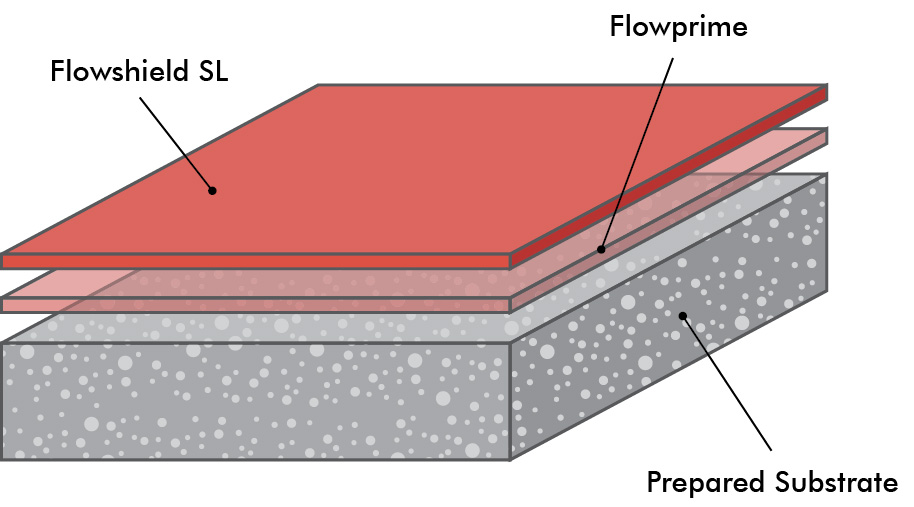
Illustration of a typical self levelling epoxy system with primer
Epoxy is probably the most widely known resin floor technology as a result of its good mechanical and chemical resistance properties. Epoxy floors can also be customised into a wide range of colours, styles, effects and decorative options.
However, there are different categories of epoxy flooring systems available for varied applications. Confusion is sometimes created when flooring terms are used interchangeably, eg. Coating = Flooring = Screed. This is not technically accurate since the different terms have their respective profiles and properties.
Let us clear things up: Here is an excellent Guide to the Specification and Application of Synthetic Resin Flooring by FeRFA (The Resin Flooring Association), detailing the different categories of synthetic resin flooring. Below is a preview of the types of flooring categories.
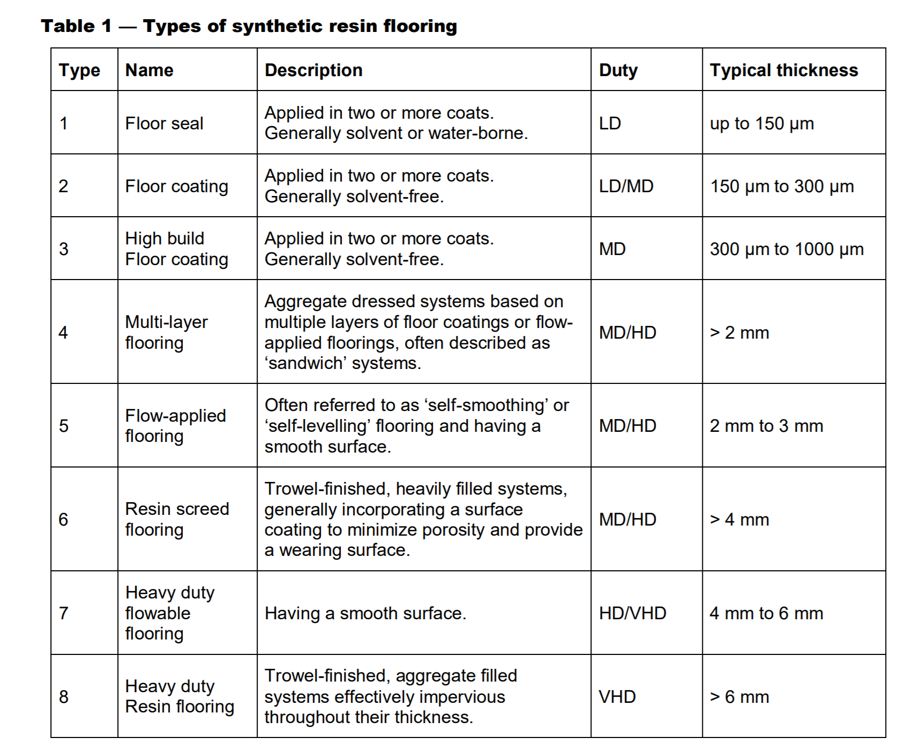 FeRFA: Synthetic resin flooring categories
FeRFA: Synthetic resin flooring categories
With proper separation, let's take a deeper dive into the different types of epoxy floors.
Types of Epoxy Flooring
In terms of aesthetics, epoxy floors are seamless, highly versatile and available to be produced in a wide range of colours, styles, effects and decorative options. These properties make them suitable for industrial and commercial facilities and locations. There are several general types of epoxy flooring, such as:
Epoxy Terrazzo Flooring
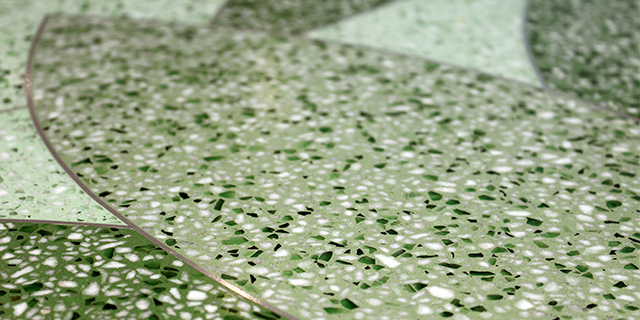 Flowcrete's Mondéco range: Seamless epoxy terrazzo flooring
Flowcrete's Mondéco range: Seamless epoxy terrazzo flooring
Epoxy terrazzo flooring provides a colourful, decorative, durable and seamless flooring surface. This type of flooring is created with a mix of coloured epoxy and selected aggregates (such as marble, mother of pearl, glass, granite, etc). After setting the mixture, the flooring is ground and polished, exposing the aggregate and delivering a smooth, decorative and hard-wearing floor finish. Epoxy terrazzo floors are not just highly decorative and very durable, they only require simple maintenance and have an outstanding life expectancy (upwards of 40 years). This floor system is ideal for large commercial venues thanks to its aesthetics, durability and lifespan.
Epoxy Flake Coating
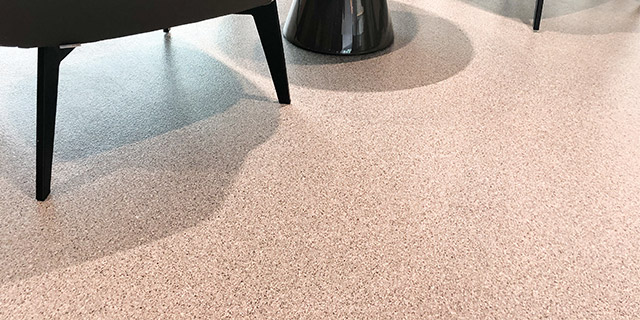 Flowcrete's Flowflake range: Seamless epoxy flake coating
Flowcrete's Flowflake range: Seamless epoxy flake coating
Epoxy flake coatings are created with varying sizes of flakes scattered over a coloured epoxy base coat and finally finished with a tough resistant clear sealer. It produces a decorative floor finish that is easy to clean and has good resistance to foot traffic and chemicals.
The epoxy flake coating option is ideal for shops, showrooms, restaurants and schools among many other commercial venues.
Epoxy Floor Coatings
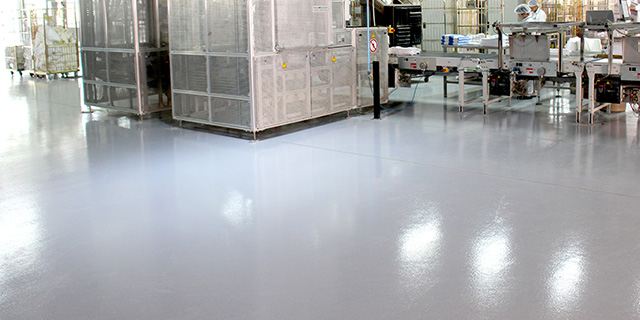 Flowcrete's industrial flooring catalogue
Flowcrete's industrial flooring catalogue
Epoxy floor coatings are sometimes also referred to as epoxy paint or epoxy floor paint. The finishes generally come in a uniform single colour, and their finishing can be chosen to be matte, satin or glossy. Epoxy floor coatings are generally used for areas with light to medium level of activities, and these can be for industrial or commercial areas. Since there is a long list of varieties and options for epoxy coatings, it is better to check with a flooring specialist to get the best-matched flooring. Dependent on the environment’s purposes and functions, there would be a suitable flooring solution available to meet the requirements.
Epoxy Self-Levellers
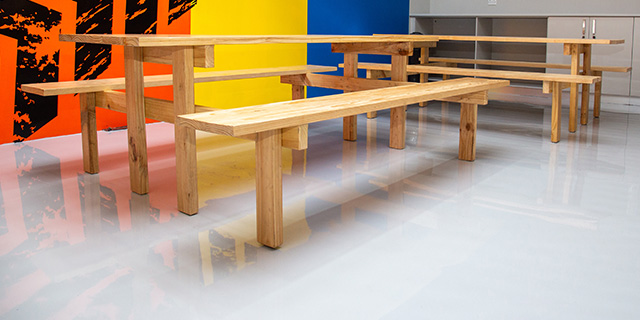 Flowcrete's Peran SL: Self-levelling epoxy
Flowcrete's Peran SL: Self-levelling epoxy
Self-levelling (SL) epoxy flooring is a category of flooring that has self-smoothing properties once poured onto the substrate. Generally, self-levelling systems are applied between 1 to 3mm and applied in liquid form for fast installation, resulting in a smooth, seamless finish. The resin-rich formulations of epoxy SL provide a very strong durable finish for heavy-duty demanding environments.
Antistatic Epoxy Flooring
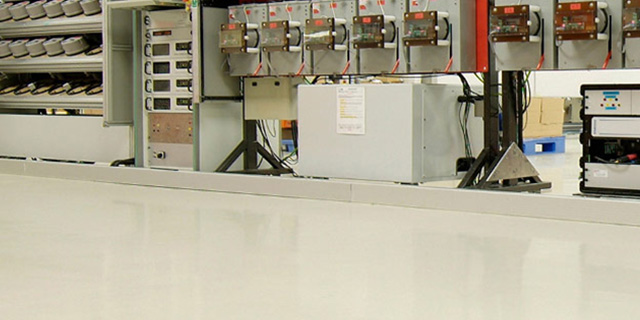 Flowcrete's antistatic epoxy flooring catalogue
Flowcrete's antistatic epoxy flooring catalogue
Antistatic epoxy flooring provides a seamless, hard wearing coating that prevents electrostatic charge from accumulating on the surface of the floor.
Antistatic floor systems should be compliant with antistatic standards requirements (eg. ANSI/ESDS2020, IEC 61340-4-1), and are designed to safely transfer the static charge – that can be generated from a person – to defined earthing points. There are specific antistatic flooring systems specifically tailored for light, medium and heavy-duty traffic.
Antistatic epoxy flooring is commonly used in laboratories, clean rooms, and specialised food processing facilities. It is typically used as part of ESD (Electrostatic Discharge) prevention in environments containing sensitive equipment or explosive contents, with environments that include the electronic, aerospace, automotive, and pharmaceutical sectors.
Epoxy Screeds
Epoxy screeds are part of a medium- to heavy-duty flooring system, and they are commonly used as a heavy-duty underlayment to receive a variety of resin flooring (such as anti-slip coatings, self-levelling epoxy coatings, etc). As a thicker type of flooring layer, an epoxy screed’s typical thickness is between 4mm and 6mm. Because epoxy screeds are thicker, they generally are to be trowel-applied, and may be power floated to produce a smooth, level finish.
Epoxy screeds have high strength and excellent impact resistance. Anti-osmosis properties may also be included in the epoxy screed to act as a damp-proof membrane.
With these properties, epoxy screeds are ideal for flooring systems in medium to heavy-duty industrial environments, such as manufacturing, food and beverage processing, and several others.
The specification/selection process of epoxy flooring is influenced by the expected functionalities and protection requirements based on the frequent activities and operations of the facility.
- ۰۱/۰۱/۲۳